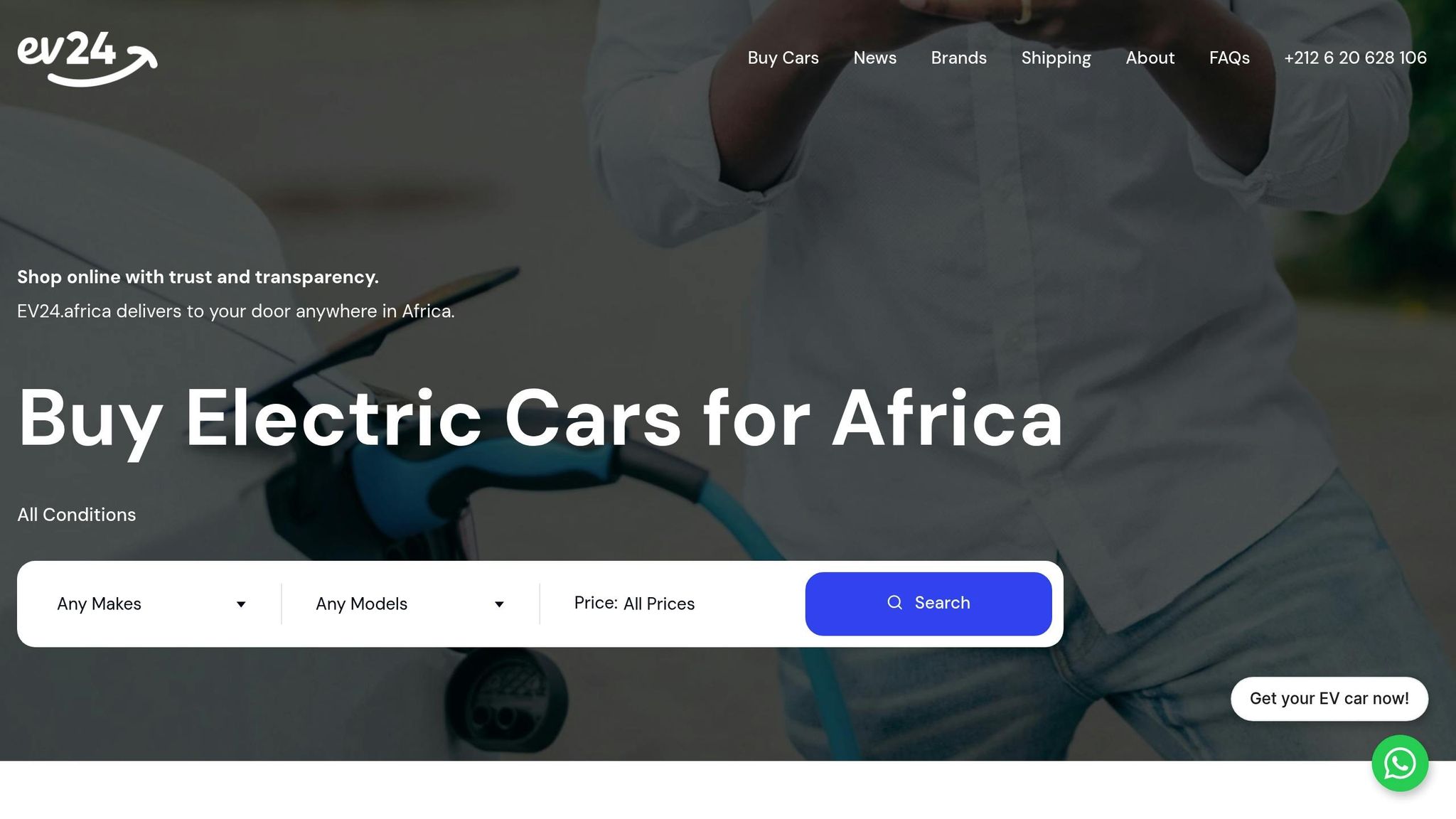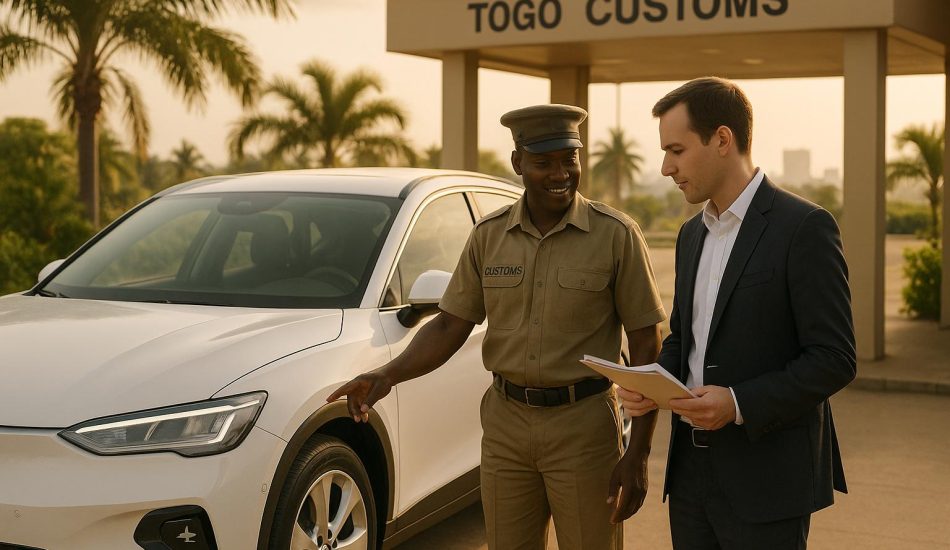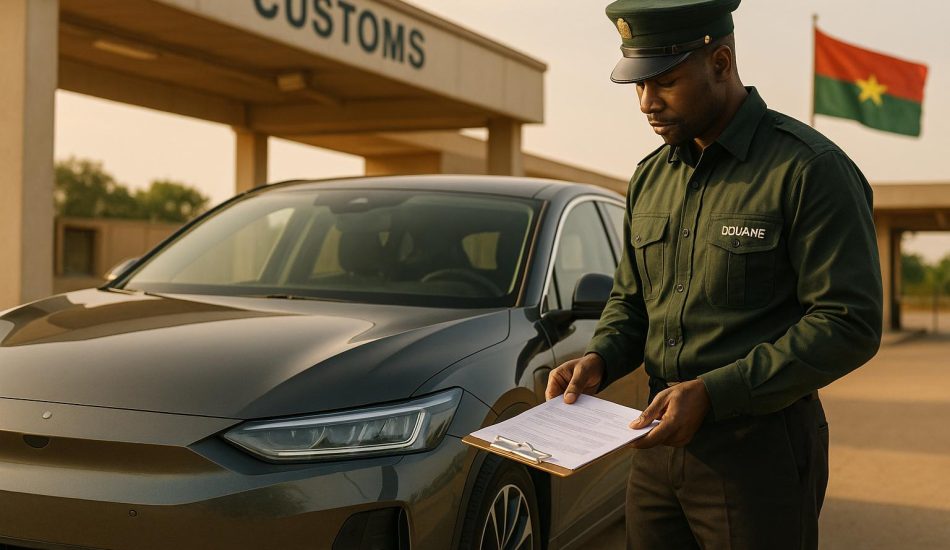
Côte d’Ivoire has introduced new 2025 rules for importing electric vehicles (EVs) to boost adoption and reduce reliance on gasoline-powered cars. These updates include lower import tariffs, tax incentives, and streamlined processes for bringing EVs into the country. The government aims to make EVs more affordable, with long-term savings on fuel and maintenance, while targeting 10% EV adoption by 2030. Compliance requires proper documentation and adherence to technical standards. Platforms like EV24.africa simplify the import process by handling logistics, financing, and regulatory requirements.
Key highlights:
- Lower tariffs and tax relief: Reduces costs for EV buyers and businesses.
- Financial incentives: Savings on fuel (up to $5,000 annually) and subsidies for buyers.
- Documentation requirements: Includes invoices, packing lists, and regulatory forms.
- Infrastructure goals: Plan to install 1,500 charging stations by 2030.
These changes aim to modernize Côte d’Ivoire’s vehicle fleet and support the transition to cleaner energy solutions.
African governments welcome Chinese electric vehicle imports, production amid looming trade war
Tariffs, Taxes, and Incentives for EV Imports
The 2025 regulations are set to shake up the cost landscape for electric vehicles (EVs), making them more appealing and competitive compared to traditional gasoline-powered cars.
Changes in Tariffs and Taxes
A new tariff structure is helping to close the price gap between EVs, which averaged $20,000 in 2023, and gasoline cars, which averaged $10,000. Alongside these adjustments, updated tax policies are designed to make EVs even more affordable.
Tax Relief and Financial Incentives
To encourage EV adoption and aim for a 10% EV fleet by 2030, the government has rolled out several financial incentives. These include reduced import taxes, subsidies for buyers, and partnerships between public and private sectors to provide additional cost savings for both importers and consumers.
In West Africa, the financial benefits of switching to EVs are particularly striking. For example, in Côte d’Ivoire, drivers can save between $3,000 and $5,000 annually on fuel by choosing an EV. For businesses managing larger fleets, the savings are even more substantial. A company operating 100 vehicles could save more than $2 million in fuel costs over just three years by transitioning to EVs.
With approximately 1.5 million vehicles on the roads in Côte d’Ivoire and fewer than 1,000 of them being electric as of 2023, these incentives not only offer a financial edge for early adopters but also play a key role in supporting the country’s environmental objectives.
Compliance Guidelines for Importers
Bringing an electric vehicle (EV) into Côte d’Ivoire involves navigating a detailed customs process that requires precise documentation and adherence to technical standards. The updated 2025 regulations aim to simplify the process while maintaining strict safety and environmental guidelines.
Step-by-Step Import Process
The first step in importing your EV is ensuring you have all the necessary documentation ready well before the vehicle arrives at the port. Here’s what you’ll need:
- Two copies each of the commercial invoice (written in French) and the certificate of origin
- One packing list
- One bill of lading
- A pro-forma invoice (six copies) to accompany your import license application.
Timing is everything when it comes to customs clearance. To avoid delays, make sure a duplicate invoice is sent via air freight to Côte d’Ivoire ahead of your shipment. Also, verify that all shipping marks align perfectly with the numbers listed on your bills of lading and invoices – any discrepancies could cause setbacks.
For containerized shipments, you’ll need a Final Classification and Valuation Report (FCVR), issued by Webb Fontaine Ivory Coast. In July 2023 alone, this organization processed over 5,000 FCVRs, with their new online portal cutting processing times by 15%. To obtain an FCVR, submit a complete set of documents, including:
- Import Inquiry Form (FRI)
- Prior Declaration of Importation (DAI)
- Delivery Advice Form (AD)
- Commercial invoice
- Bill of lading
- Packing list
- Any related paperwork.
Once all your documentation is in place, the next step is ensuring your EV complies with Côte d’Ivoire’s technical and regulatory standards.
Technical and Regulatory Standards
Compliance with technical standards is just as important as proper documentation. Imported EVs must meet both local safety requirements and international technical benchmarks. Key regulations include age limits, emissions standards, and duty fees, which vary depending on your vehicle’s specifications.
Working with an experienced shipping company can help you navigate these technical requirements more efficiently.
Foreign investors in the EV sector can also take advantage of streamlined tax and customs processes under the Ivorian Investment Code. To access these benefits, you’ll need to apply through the investment promotion agency and use the single investment services portal at www.225invest.ci.
Côte d’Ivoire’s membership in the West African Economic and Monetary Union (WAEMU) adds another layer of regulatory alignment. This regional framework ensures your EV meets shared standards while supporting the country’s economic growth, which has consistently averaged between 6% and 7% annually.
While foreign direct investment in EVs doesn’t require specific government approval, it must be declared for statistical purposes to the Directorate of External Finances and the Central Bank of West African States (BCEAO). This straightforward declaration process helps the government monitor the expanding EV market.
Impact of the Regulations on EV Adoption and Costs
The 2025 electric vehicle import regulations are set to reshape Côte d’Ivoire’s automotive sector, influencing both the accessibility of EVs and their cost dynamics for consumers and businesses alike.
EV Accessibility and Affordability
One of the main hurdles to EV adoption in Sub-Saharan Africa has been their high purchase price. On average, an electric vehicle costs $20,000, compared to just $10,000 for a gasoline-powered car. This significant price gap has kept EVs out of reach for many, leaving the country with fewer than 1,000 electric vehicles out of a total fleet of 1.5 million vehicles as of 2023.
However, a shift is occurring, particularly in emerging markets, where Chinese EVs are now being sold at prices lower than traditional internal combustion engine (ICE) vehicles. Additionally, EVs promise significant long-term savings, with operating costs nearly 50% lower than their ICE counterparts. This makes them especially appealing for businesses and fleet operators, who can benefit from reduced fuel and maintenance expenses over time.
Côte d’Ivoire has set an ambitious goal: ensuring 10% of its vehicle fleet is electric by 2030. Achieving this will require substantial infrastructure upgrades, including the installation of approximately 1,500 charging stations by 2030. To support this transition, the government is exploring fiscal incentives and partnerships with private entities, signaling a strong push to make EVs more accessible.
One of the critical challenges addressed by the new regulations is infrastructure readiness. Historically, poor electricity networks and a lack of public charging stations have slowed EV adoption across Sub-Saharan Africa. In Côte d’Ivoire, where electricity production reached 2,000 MW in 2022, strengthening the national grid will be essential to meet the growing energy demand from electric vehicles. This evolving cost structure highlights the need to compare EVs with traditional vehicles.
EVs vs Conventional Vehicles Comparison
The table below highlights the key differences between electric and conventional vehicles, illustrating how the 2025 regulations influence these factors.
| Factor | Electric Vehicles | Conventional Vehicles |
|---|---|---|
| Average Purchase Price | ~$20,000 | ~$10,000 |
| Operating Costs | 50% lower than ICE vehicles | Higher fuel and maintenance expenses |
| Maintenance | Fewer parts, simpler maintenance | Regular oil changes and engine upkeep |
| Infrastructure Needs | 1,500 charging stations needed by 2030 | Established gas station network |
| Environmental Impact | Lower emissions, reducing transport sector’s carbon footprint | Higher emissions |
This comparison shows that while conventional vehicles remain more affordable upfront, EVs can deliver significant savings over time through lower operating and maintenance costs.
Côte d’Ivoire’s regulatory efforts align with global trends, aiming to reduce the transport sector’s environmental footprint. In 2020, transportation accounted for 30% of the country’s total emissions. By encouraging the shift to electric mobility, the government is addressing both economic and environmental goals. Measures such as expanding charging infrastructure, introducing fiscal incentives, and raising public awareness are part of a broader strategy to accelerate EV adoption.
Nevertheless, infrastructure readiness remains a significant hurdle. Regulatory delays, bureaucratic inefficiencies, and inconsistent electricity supply continue to challenge the rollout of charging networks and inflate related costs. For long-term success, integrating renewable energy into the grid will be crucial to ensure a reliable and sustainable energy supply for the growing fleet of electric vehicles.
sbb-itb-99e19e3
How EV24.africa Simplifies EV Imports in Côte d’Ivoire

With Côte d’Ivoire’s updated 2025 EV import rules, EV24.africa has made it easier for individuals and businesses to embrace electric mobility by streamlining the entire import process.
Key Features of EV24.africa
EV24.africa serves as a specialized marketplace connecting Ivorian buyers with electric vehicles from trusted suppliers across Europe, Asia, North America, and Japan. The platform offers a wide selection of popular brands, including Tesla, BYD, Leapmotor, ROX, Dongfeng, Geely, Hyundai, Toyota, and Suzuki, catering to both new and used EV markets.
One of its standout features is the transparent pricing model, with costs clearly displayed in US dollars. This helps buyers estimate their total import expenses with confidence.
To address the challenge of upfront costs, EV24.africa provides flexible financing options, making electric vehicles more accessible to a broader audience.
The platform’s logistics network spans all 54 African countries, offering Roll-on/Roll-off (RoRo) and container shipping. Buyers can select between port-to-port or door-to-door delivery, with real-time tracking available throughout the shipping process.
"We make importing and buying electric vehicles (EVs) easy, handling everything from sourcing to shipping and delivery in all 54 African countries."
- EV24.africa
With a team of over 200 professionals across five African countries and partnerships in more than 40 nations, EV24.africa provides strong local support while sourcing vehicles globally. This comprehensive setup not only simplifies the buying process but also ensures compliance with regulatory requirements.
Ensuring Compliance and Accessibility
EV24.africa aligns its services with Côte d’Ivoire’s regulatory framework, ensuring a seamless transition from policy to marketplace. The platform stays updated on evolving requirements, such as product conformity assessments, technical standards, and documentation needs, to ensure buyers remain compliant with all legal obligations.
The platform handles essential permits and offers Delivered Duty Paid (DDP) services, which cover customs clearance, registration, and import taxes. This eliminates delays and penalties that could otherwise drive up costs and disrupt delivery timelines.
EV24.africa also provides buyers with the latest information on tariffs, taxes, and government incentives for EV imports. This guidance helps customers calculate accurate total costs and take advantage of financial incentives – a critical aspect as Côte d’Ivoire aims for 10% electric vehicles in its fleet by 2030.
Beyond the import process, the platform offers after-sales support, including warranty management and connections to local service partners for maintenance and repairs. It also ensures compliance with technical standards like energy labeling, safety protocols, and environmental regulations, reducing the risk of unforeseen complications.
For businesses looking to electrify their fleets, EV24.africa offers tailored solutions for bulk imports while ensuring all regulatory requirements are met. These services complement the streamlined compliance process, making fleet electrification an attractive option. With operating costs for EVs being up to 50% lower than those of traditional vehicles, this solution is particularly appealing to cost-conscious enterprises.
Conclusion
Côte d’Ivoire’s 2025 electric vehicle (EV) import rules represent a major step toward reshaping the country’s transportation landscape. With a goal of achieving 10% EV adoption by 2030, the government is not only pushing for greener mobility but also offering enticing financial incentives. Businesses investing in EVs can deduct 35% to 40% of their fixed asset investments from taxable income, provided they meet the minimum thresholds of XOF 100 million for large companies and XOF 25 million for small and medium enterprises.
On the environmental front, these measures aim to tackle the challenges posed by the transport sector, which contributed roughly 30% of Côte d’Ivoire’s total emissions in 2020. With fewer than 1,000 electric vehicles on the road out of a total fleet of 1.5 million vehicles in 2023, the government plans to ramp up infrastructure by installing 1,500 charging stations by 2030.
The introduction of a five-year age limit on imported used vehicles is another impactful move. This regulation helps modernize the country’s vehicle fleet with safer and more efficient cars, while still keeping the used car market accessible. Playing a pivotal role in this transition is EV24.africa, a company streamlining the EV import process. By sourcing vehicles from over 40 countries and managing customs clearance, regulatory compliance, and financing, EV24.africa provides a transparent and hassle-free experience with pricing in US dollars.
"At EV24.africa, we simplify the process of importing and buying electric vehicles in Africa. Our expertise ensures a seamless, transparent, and stress-free experience, so you can focus on driving the future of mobility."
These initiatives are paving the way for a new chapter in Côte d’Ivoire’s automotive sector, blending sustainability, innovation, and accessibility.
FAQs
What documents will I need to import an electric vehicle into Côte d’Ivoire under the 2025 regulations?
To bring an electric vehicle into Côte d’Ivoire under the 2025 regulations, you’ll need to gather a few essential documents:
- Purchase invoice: This should detail the vehicle’s specifications and purchase price.
- Export certificate: Issued by the country where the vehicle was bought.
- Bill of Lading: Provides shipping details for the transport of the vehicle.
You might also need to show proof of registration with Côte d’Ivoire’s trade and tax authorities. Make sure all your paperwork is accurate and complete to avoid unnecessary delays or issues during the import process.
How will Côte d’Ivoire’s 2025 EV import rules and incentives affect the cost of owning an electric vehicle compared to a gas-powered car?
Côte d’Ivoire’s 2025 EV Import Rules and Incentives
Côte d’Ivoire is making electric vehicle (EV) ownership easier and more affordable with updated import rules and financial perks set for 2025. Among the key changes are lower import tariffs and exemptions from VAT and customs duties, which will slash the upfront costs of EVs, putting them within reach for more buyers.
Beyond the reduced purchase price, EVs are expected to offer substantial savings on running costs. With electricity prices being much lower than gasoline, operating an EV could cut expenses by as much as 50%. These measures not only reduce the financial barriers to owning an EV but also position them as a smarter, cost-effective option for drivers in Côte d’Ivoire.
What is the government doing to improve charging infrastructure for electric vehicles in Côte d’Ivoire?
Ivory Coast’s Push for EV Charging Infrastructure
The Ivorian government is making strides to improve the country’s electric vehicle (EV) charging network, aiming to keep up with the rising interest in EVs. Part of this effort involves setting up charging stations in major urban areas and along key highways, making longer journeys between cities more practical for EV owners.
To ensure these efforts are sustainable, the government is also focusing on renewable energy integration and expanding the national power grid. This approach aims to provide a steady and dependable energy supply for EVs. On top of that, financial incentives and creative funding options are being rolled out to support the construction of charging stations and to make EV ownership a realistic option for both individuals and businesses.




